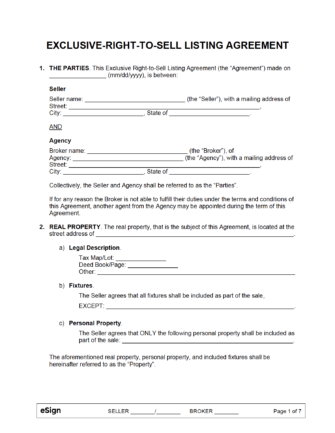

An exclusive right-to-sell listing agreement is a real estate contract that gives an agent or broker the sole right to sell their client’s home for a set length of time. It establishes the property’s asking price, the agent’s commission, the term of the agreement (often between 1 and 12 months), and the duties both the agent and seller will be bound to uphold. Unlike other listing agreement types, the agent is guaranteed a commission if the property is sold, regardless if they found the buyer or not.
Like any other contract, real estate or otherwise, the information of both the seller and the broker/agency must be outlined in the agreement. The names and addresses of both parties and the date they entered into the agreement must be included in the contract.
The property being sold must be properly identified to prevent any uncertainty upon closing. The address must be provided as well as a legal description of the property; this could include the tax map/lot, the book and page number where the deed can be found in public records, and any other essential identifying information. If any personal property is included in the sale, the seller can enter these items in this section.
By signing an exclusive right-to-sell listing agreement, the seller agrees that the agency will receive a commission regardless of whether or not they were directly responsible for finding the buyer. Furthermore, while the listing period is still active, the seller cannot hire any other broker.
Dual agency refers to the act of a broker representing both the seller and the buyer in a real estate transaction. The broker must exercise responsibility and impartiality when acting in such a position, keeping the best interests of both parties in mind. Ultimately, it is the seller’s decision whether or not they wish to allow the broker to act as a dual agent; however, a number of states have made dual agency illegal.
The listing period, or “period of agreement,” establishes the time frame within which the agency will work to sell the seller’s property. If they do not find a prospective buyer within the allotted time period, they do not receive a commission. Common lengths of time for a listing period are thirty (30) days, ninety (90) days, six (6) months, or one (1) year.
Also known as a “protection period” or a “tail,” this safety clause guarantees the broker a commission should the property sell after the listing period expires. It mainly applies to prospective buyers the listing agent previously engaged with (whether by showing the property or by providing them information). The parties can often negotiate the length of the protection period and what constitutes a “prospective buyer” in the first place.
The average commission a listing agent receives is between five and six percent (5-6%), a portion of which will be paid to the buyer’s agent (unless the agent acts as a “dual agent”). Negotiating for a lower commission could decrease the level of motivation and marketing efforts the agent will provide and isn’t recommended unless the seller has every reason to believe their home will sell quickly and with little effort on behalf of their agent.
Agents will provide a host of services in order to find prospective buyers for their client’s property. Some of these services include placing “for sale” signs on the property, having professional photos taken of the interior and exterior, staging the property with rented or owned furniture, uploading the property to various listing sites, and conducting “open houses” to give passerby an option to view the home. Should a client not want one (1) or several of these services, they can “negotiate” to have them removed.
The agent will conduct research by comparing similar properties that were recently sold in the area, the current market, as well as the condition of the property. The agent will inform the seller of the price they recommend the property be sold for. While sellers will often go with their agent’s suggestion, the price that is set is ultimately up to them.